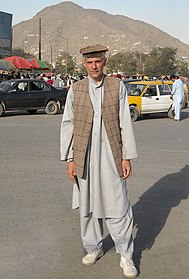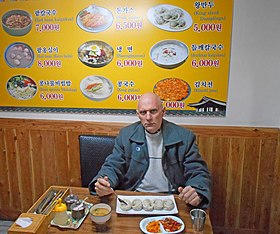Basics of fine-art photography/Self-portrait

"Afghan expedition"
Self-portrait is an image by the author of himself, in this case with the help of a camera. Can be considered as a separate genre, or (more precisely) a subgenre of portrait photography.
General information
[edit | edit source]The term self-portrait was originally conceived, refer to an artist's own portrait.
In relation to capturing oneself with a photographic apparatus, the word "selfie" has been relatively recently introduced, formed by the abbreviation of the term "self portrait" for a simplified pronunciation in colloquial speech.
However, if regarding to the work of artist, the concept of "self-portrait" indicates that the result belongs to art; “selfie” does not mean a work created as an art object (or with a claim to something creative), but is only an image of the owner of a camera or smartphone (tourist, vacationer, beachgoer, etc.) made by him with outstretched hand or using a special stick. Such photographs are created for commemorative (family) albums; publications in social networks; memories of tourist trips, vacations abroad and are not related to concept, the basics of which are covered in this textbook.
Ways of implementation
[edit | edit source]In order to make an exposure-quality, artistically portrait of yourself, preparatory steps will be required. Initially, you need to decide on the idea: what your portrait will mean, for what purpose it is conceived. Take a look at some examples:
- Self-portrait made for the textbook "Hobo Tourism Journalism", where the author is depicted with a notebook, pen and backpack, and it's symbolic;
- A variant created in the genre of photoart to illustrate a literary miniature is a staged work corresponding to the text content.
- The sample of stylized self-portrait for the book "Afghan Prisoner": it is forbidden to take a pictures in places of detention, a self-portrait was made upon returning from the expedition and placed on the inside cover page
Equipment
[edit | edit source]You can create a self-portrait using a tripod (if the camera is voluminous and heavy) or a clamp (if using a compact camera). It is easy to do without these accessories, following the example of the author, who is a supporter of hobo tourism (where lightweight equipment is used), for this you need to find a level support for the camera — a stump (in the forest), a parapet (in the city), a large stone or boulder (on sea or ocean coast), then set the built-in timer to the maximum time and move away, taking the required position. Modern digital technology, unlike analog (film) cameras, allows you to make an unlimited number of takes, removing unsuccessful options.
Gallery
[edit | edit source]-
With a refrigerator under palm trees (Tonga)
Photo taken on the Expedition to Oceania -
In the wilds of Africa (Zambia)
Photo taken on a Third creative trip to Africa -
Almost local (Kabul, Afghanistan)
Photo taken on an Afghan expedition -
5,000 won lunch (Suwon, South Korea)
Photo taken on the Expedition to Oceania





